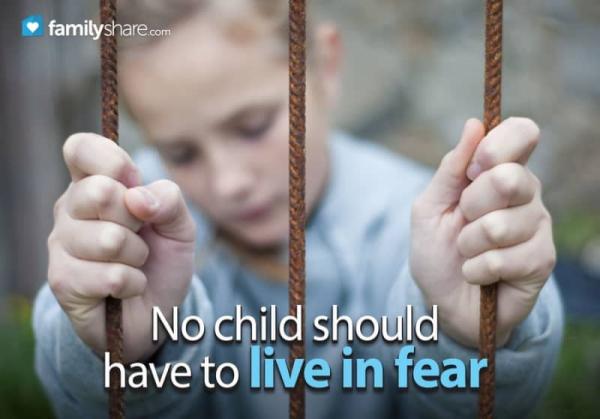
At 8 years old, I should be worrying about spending more time my friends, if I'm getting the bike I want for Christmas and what's for dessert. I should not have to be cowering behind boxes in the basement shaking with fear, wondering what is coming next. Across the world, a 6-year-old boy covered in deep purple bruises should not have to hide his abuse because of the stigma involved. A small girl in South America should not have to hide from her father.
The United Nations Secretary-General's study on Violence Against Children (UNSG Study) states:
"Many people, even children, accept violence as an inevitable part of life. Often, children who have suffered violence or those who are aware of such violence keep quiet because there are no safe or trusted ways to report the violence or get help."
As a survivor of child abuse, I understand the fear and shame victims of child abuse struggle with daily. When I was 8 years old, my mother realized something was wrong. I was fortunate to have her stand up in my defense. She packed us up in the van and with just the clothes on our back, drove away. Because she stood up in our defense, I was able to heal and obtain the help I needed to start the process of overcoming years of abuse.
When a child is abused, in any form, it changes them. Growing up, I had feelings of inadequacy and worthlessness. I had determined in my young mind that the abuse was, in fact, my fault. I believed my perpetrator when I was told I was wrong. My abuser told me my mother would hate me if she found out. Many children adopt these same feelings when they are abused; hiding their shame and suffering guilt. My experiences have also given me great hope for children who are heard, believed and protected allowing them to begin the healing process. These same children, if not helped early, can develop many social and emotional issues. Child abuse victims may have problems with:
-
Low self-esteem
-
Depression and anxiety
-
Post-traumatic stress disorder (PTSD)
-
Attachment difficulties
-
Eating disorders
-
Poor peer relations
-
Self-injurious behavior (e.g., suicide attempts)
This is a worldwide problem. The UNSG Study estimated worldwide
-
The prevalence of forced sexual intercourse and other forms of violence involving touch, among boys and girls under 18, is 73 million (7 percent) and 150 million (14 percent) respectively.
-
The percentage of school-aged children that reported having been verbally or physically bullied at school in the previous 30 days ranged from 20 percent in some countries to as high as 65 percent in others.
-
Each year, it is estimated as many as 275 million children worldwide witness domestic violence. This exposure has both short and long-term negative impacts on children's development.
-
Abuse breeds abuse. A child who is abused has a greater chance of growing into an adult who is abusive if not given help.
Children do not need to suffer in this way
They should not have to live in fear. We can stop child abuse and violence. There are many ways to do this:
-
Take a stand for the family. The family unit is central to a healthy child. Education on abuse starts at home. Educate your family, and work hard to provide a stable and loving environment for your children. The UNSG Study suggested a loving environment and attachment to parents as one of the number one ways to prevent abuse.
-
Speak up. If you have been a victim of abuse, or know of an abusive relationship, say something. There are many organizations to contact. A friend or parent is a good start, and law enforcement officers or local church leaders can usually help.
There are many hotlines and websites for child abuse worldwide
-
US or Canada: 1-800-422-4453 (Childhelp)
-
UK: 0800 1111 (NSPCC Childline)
-
Australia: 1800 688 009 (CAPS)
-
New Zealand: 0800-543-754 (Kidsline)
-
Other international helplines: (ChiWorld.org)
To the victims and parents of child abuse, know there is hope. Abuse can be overcome. It is not your fault, and you don't have to feel ashamed or guilty. You can get help. It may take a lifetime of work, but it's well worth your life to give it all you have.
I was able to begin my life journey to heal because I have a mother and family that listened to me, believed me and provided me with safety and professional support. Not all victims of abuse are as fortunate, but they can still begin the healing process with determination, prayer, and love. Seek out local organizations that help victims of abuse.
Later in life, as a young adult, I met an amazing man with whom I wanted to spend my life. I thought I had put my abuse behind me. I had undergone years of therapy and work. I was doing great, but I soon realized I still had some work to do. I was filled with feelings of guilt, shame and anger all over again. I needed to learn to forgive my perpetrator. Many years later, with some hard work and much prayer, I feel I have been able to let go and find peace and forgiveness. I will always remember what happened; it has shaped me, but I will not let it anchor me to the past without hope of developing a bright future.

